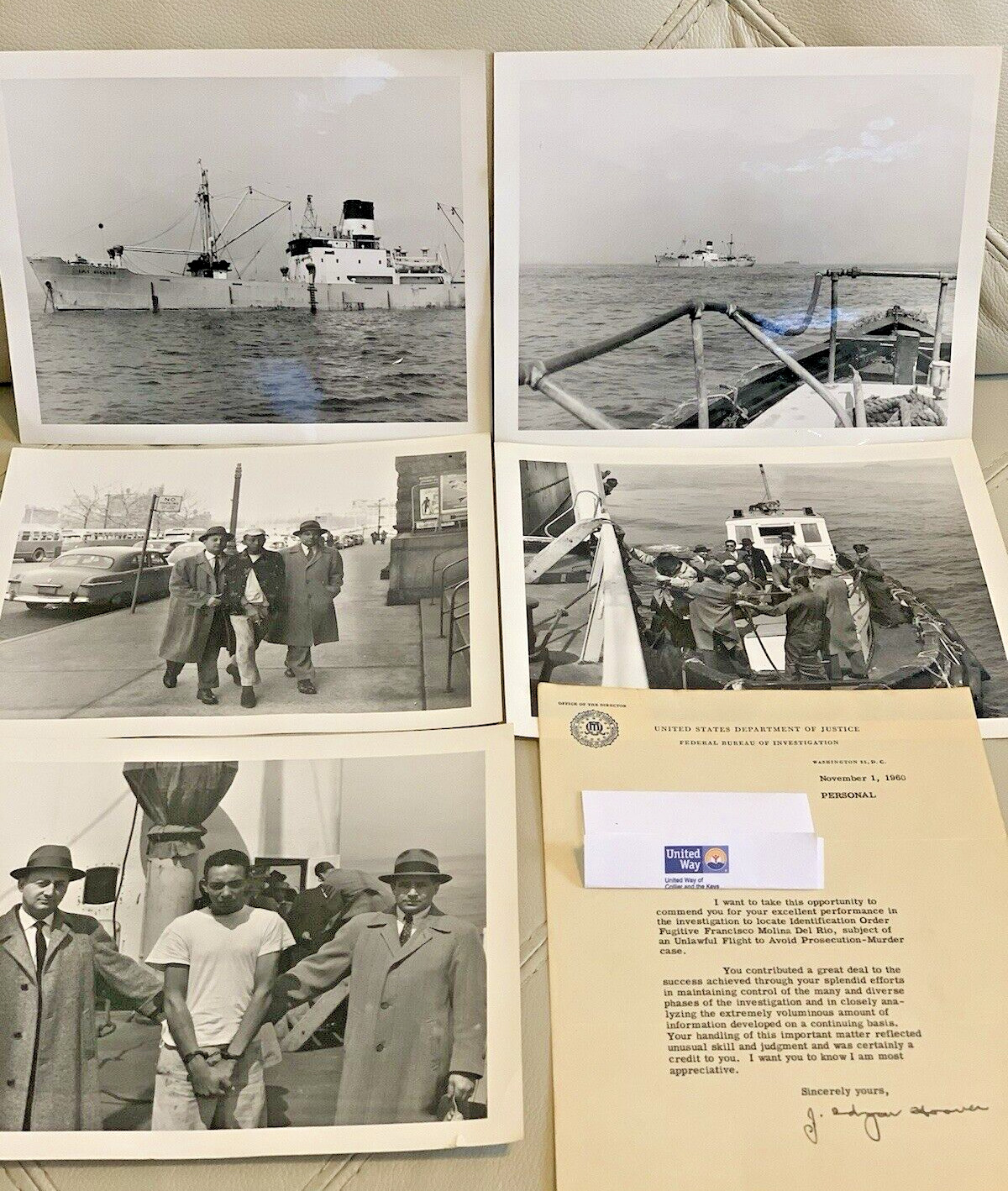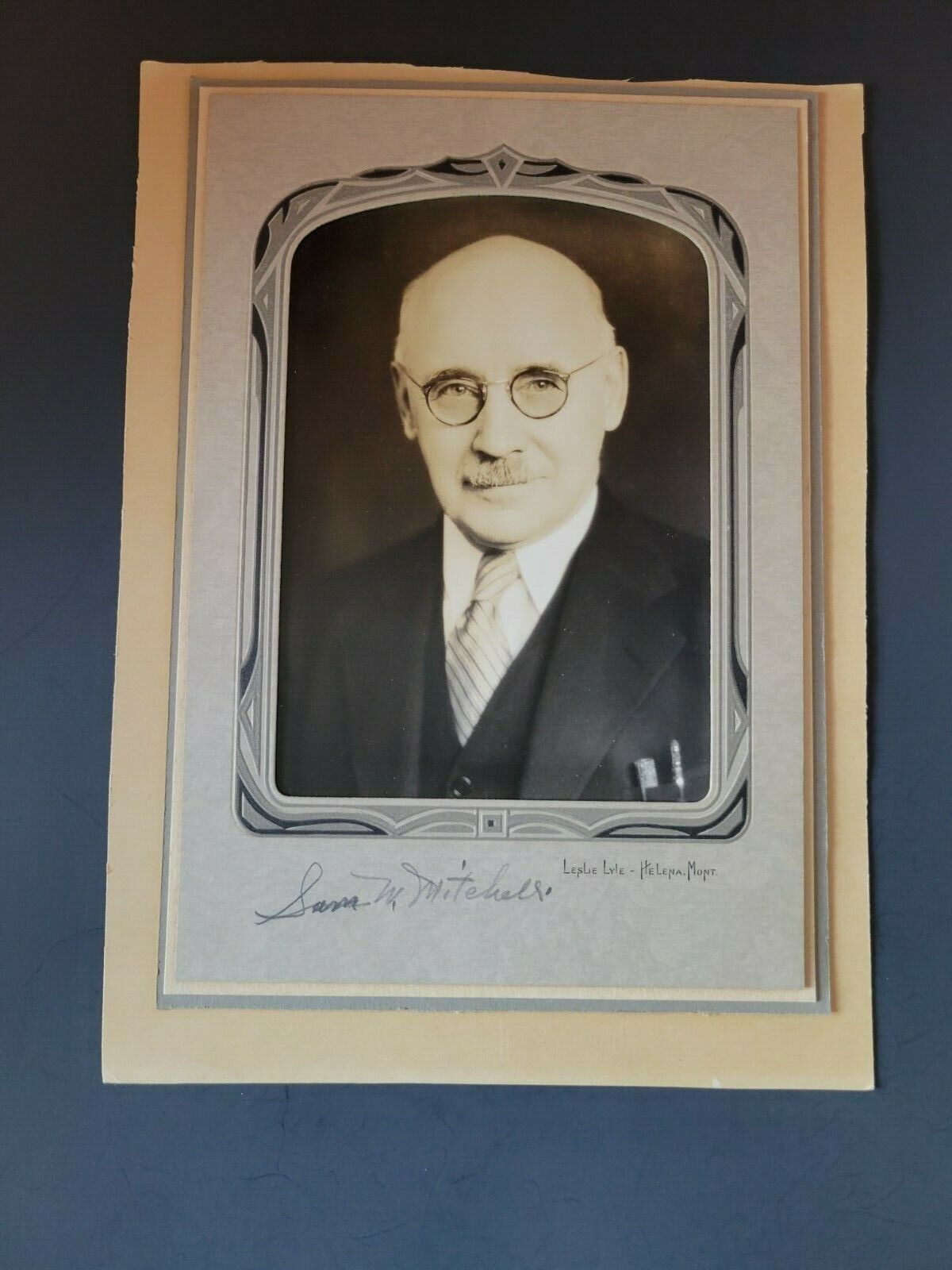-40%
RARE: J Edgar Hoover Signed Letter & Pics thanking Agent for arrest of Fugitive
$ 316.8
- Description
- Size Guide
Description
Extremely Rare one of a kind no others out there..PEOPLE -VS- FRANCISCO MOLINA DEL RIO
PERSONAL COMMENDMENT LETTER SIGNED J. EDGAR HOOVER
100% AUTHENTIC FBI SUPERVISORY SPECIAL AGENT OWNED.
This is a rare opportunity to own a piece of political history. The letter and photos attached are a testament to the incredible work done by Agent X in the arrest of a high-profile fugitive "Francisco Molina Del Rio." The signature of J Edgar Hoover, the former Director of the FBI, adds to the value of this item. The photos and signature are original and authentic, making this a unique addition to any collection. The item was manufactured in the United States and has not been modified. This is a must-have for any collector of political autographs or memorabilia.
January 22, 1963.
Appeal from the Court of General Sessions, New York County, MITCHELL D. SCHWEITZER, J.
Samuel A. Neuberger and Andrew R. Tyler for appellant.
William F. Reilly of counsel ( H. Richard Uviller with him on the brief; Frank S. Hogan, District Attorney), for respondent.
Marvin Moses Karpatkin ( Janet Ann Johnson with him on the brief), for New York Civil Liberties Union, amicus curiae.
Per Curiam.
Defendant was convicted of the crimes of murder, second degree, and assault, first and second degrees, upon an indictment charging murder, first degree, attempted murder, first degree and assault, first degree. On the conviction for murder, second degree, he was sentenced to State prison for a period of 20 years to life. On the conviction for assault, first and second degrees, he was sentenced to 5 to 10 years and 2 to 5 years, respectively, such sentences to run concurrently with the first sentence.
The shootings, which resulted in the indictment, occurred during a fight between pro- and anti-Castro forces that took place on September 21, 1960 in the El Prado Restaurant on Eighth Avenue in the Borough of Manhattan. By its verdict, the jury has found that defendant, in the course of that melee, shot and killed a nine-year-old girl — who was in the restaurant with her family waiting to be served — and that defendant wounded one Rodriguez, and assaulted another, Triana, both of whom were so-called anti-Castro.
On this appeal, the convictions are assailed on a multiplicity of grounds including a claimed denial of the constitutional right to counsel, the deprivation of the right to cross-examine witnesses, the denial of a fair trial, alleged prejudicial pretrial procedures, and the denial of a new trial based on the recantation by Triana — a witness for the People — of certain of his testimony at the trial. Soon after the trial, Triana was taken prisoner by the Castro forces when he participated in the abortive Bay of Pigs landings in Cuba.
On appellant's claim that the verdict was against the weight of the evidence, it suffices to say that there is uncontroverted credible evidence in the record to support the verdict of the jury. Eyewitnesses testified that defendant was an active participant in the fight and was the only one armed with a gun, which he discharged three times. The first shot was fired into the ceiling and shots two and three were fired at Rodriguez. The latter two shots were fired after Rodriguez shouted a warning to Triana, at whom defendant was pointing the gun. Only one of the two shots fired at Rodriguez struck him, and it is a fair inference that the other shot mortally wounded the child, who, according to one witness, was seated directly in the line of fire.
Additionally, there was also testimony by an expert in ballistics that the bullet removed from the deceased girl, and the one recovered from the ceiling of the restaurant were fired from the same pistol, and also that the spent cartridge cases that were found on the restaurant floor were also fired from the same gun. There was also evidence of defendant's flight and his secreting himself from September 21 when the shooting occurred until he was apprehended on October 14, 1960.
However, three of appellant's contentions require further exploration and comment. The claim is made that the defendant's constitutional right to counsel was violated because, for a substantial period of time following his arrest, he was denied the right to communicate with counsel through an interpreter of his own selection.
An examination of the record, however, does not support this claim. The defendant was arrested in the morning of October 14, 1960. When counsel appeared at the station house that afternoon, defendant denied they were his lawyers. On their return that evening, they could not see defendant because he was then in the process of being booked.
Upon defendant's preliminary arraignment in Felony Court the following day, his counsel asked leave to confer with him with an interpreter of his own choosing. The arresting officer, who was responsible for him at that time, protested the use of the defendant's interpreter because of security reasons. After discussion between court and counsel as to whether the proposed interview was to take place in the "regular way" — which would be in the Tombs and subject to the applicable rules — or in the court, permission was granted defendant to confer with counsel in the corner of the courtroom with two officers and a court-appointed interpreter, and no one else. Counsel did not avail himself of this offer but was content to advise the defendant that he was retained by his uncle and that defendant need make no statement to anyone but his attorney, and that a hearing would be requested and court order obtained to consult with him in private. This statement was conveyed to defendant by means of the court interpreter and the matter was adjourned. The complaint in the Felony Court was dismissed when the defendant was indicted on October 19, 1960.
The claim that defendant was effectively denied the right to counsel inasmuch as he was denied the right to communicate with counsel through an interpreter of his own selection becomes totally untenable when viewed against the background of the proceedings during which defendant had available to him the services of his own interpreter, following his indictment.
On October 21, when the defendant was arraigned on the indictment, his counsel filed their notice of appearance and asked for permission to confer with defendant through Mr. Tapia, defendant's own interpreter. That request was granted and following a conference by defendant with counsel, in the courtroom, through Mr. Tapia, counsel asked for an adjournment for all purposes. The defendant's request was granted and the case adjourned to November 4.
On October 21, 1960, while in court, and after the application for an adjournment had been granted, counsel for defendant orally moved for permission that the interpreter of defendant's choice be permitted to be present with his counsel on visits to the City Prison. The court's attention was directed to the rule of the Department of Correction which provides: "No person shall be permitted to visit an inmate of an institution who is charged with homicide or detained as a material witness unless such person presents a written authorization from the District Attorney of the County concerned and produces sufficient proof of his identity" (Rules and Reg. of Dept. of Correction, § 434).
The court ruled that counsel would have to proceed in the usual manner in conformity with the Rules and Regulations of the Department of Correction, and if then counsel felt that the defendant was being deprived of any rights, a formal written application could be made for relief.
Counsel refused to comply with the rule and moved (on written papers) for such permission, contending that the Department of Correction rule deprived defendant of due process. Meanwhile on October 21 the District Attorney cut the Gordian knot and sent a letter to the correction authorities, informing them that he knew of no reason to deny permission to the defendant's interpreter to accompany and assist counsel in his conferences with defendant in the City Prison.
Obviously, the Correction Department, for security reasons, must limit visits to defendants in their custody, particularly in cases where the defendant is charged with homicide. The application of the rule in this case did not result in denial of due process. While the defendant did not consult with counsel through an interpreter of his own choice from the date of his arrest arraignment in Felony Court on October 15, 1960 until October 21, 1960, there is no valid showing of resulting prejudice. The record establishes that at every subsequent stage defendant's interpreter was available for consultation with counsel and defendant has failed to demonstrate that in any aspect of the subsequent proceedings his rights or ability to conduct his defense were adversely affected by the antecedent failure to consult with counsel through an interpreter of his own choice.
On October 26, 1960, counsel also moved for an inspection of the Grand Jury minutes. That motion was denied on November 3, 1960. Counsel also filed a demurrer to the indictment on November 2, 1960. On November 4, counsel requested an adjournment for all purposes, and upon that application the case was adjourned to November 18. On November 16, counsel for defendant served a notice of motion returnable on November 21 for reargument of the motion for inspection of the Grand Jury minutes. On the argument of that motion on November 21, the arraignment was again postponed to November 30. On November 30, 1960, defendant was arraigned and pleaded "not guilty".
Thus, defendant was represented in the Felony Court; counsel visited him thereafter in the City Prison; he consulted with counsel on the return of his indictment in the old Court of General Sessions and his interpreter was admitted immediately thereafter. Indeed, he had counsel from the very day of his preliminary arraignment in Felony Court, and, if the interpreter of his own selection was not available to facilitate his conferring with his attorney, it was the fault of the latter because of his failure to comply with the rules of the City Prison with relation to visitors. In any event, "he had counsel in ample time to take advantage of every defense which would have been available to him originally". ( Canizio v. New York, 327 U.S. 82, 86.) For the period from October 21, 1960 until trial commenced on March 15, 1961 — at all critical stages in the criminal proceeding — defendant had the benefit of his own interpreter. On this record, we hold that defendant's constitutional right to be heard with counsel was not violated.
The claim that defense counsel was improperly restricted in his cross-examination of four People's witnesses is predicated on the court's permission to these witnesses to claim their privilege against self incrimination.
These four witnesses were members of anti-Castro organizations and this fact was developed on direct examination. When their cross-examination reached the point where an attempt was made to elicit information regarding their participation in Florida and Cuba in organizational activities for the violent overthrow of the existing government in Cuba, the District Attorney alerted the court's attention to a request from the Federal Government not to permit questions in this area. Thereafter, the witnesses, in response to such questions, were permitted to invoke their privilege against self incrimination.
At that stage of the cross-examinations, it was no longer any secret to the jury that these four witnesses were vehemently anti-Castro and that they were actively engaged in opposing him. Their admissions as to their part in the melee at the restaurant made that crystal clear. What they may or may not have been doing in Miami by way of preparation to invade Cuba was only cumulative on the question of their hostility to Castro and the defendant and on the matter of their credibility. The claim that Rodriguez' training in commando tactics was material to the question of defendant's intent to kill Rodriguez when he fired two shots at him is farfetched. Rodriguez testified he lunged at the defendant to prevent his shooting Triana in the back. The theory of the defense was that the shots were accidentally triggered by Rodriguez when he lunged at the defendant. This contention was presented to the jury and was decided against the defendant. Whether Rodriguez, with or without this commando training, would have reached the defendant is purely conjectural. The short answer is that two shots were fired and not one.
Since we find no prejudice to this defendant resulting from the refusal of witnesses to answer questions on cross-examination because their answers might incriminate them, it is unnecessary for us to reach the subsidiary question of the propriety of the ruling of whether national policy may be invoked to the prejudice of a defendant in a criminal prosecution. Nor, in view of our determination of lack of prejudice, do we reach the further contention that as to certain questions there was no substance to the witnesses' claims of self incrimination.
We agree that the cross-examination by the Assistant District Attorney of the defense witness Manola as to his activities in Cuba, and the prosecutor's statement to the court — after objections to the question had been sustained — that the question was asked "with a basis and not out of thin air" were improper. However, we are of the opinion that they were not so prejudicial as to require a new trial. The prosecutor should not have persisted in pursuing this line of interrogation after the court had sustained an objection to the first question in that series. But, the court promptly sustained the objection of defense counsel and adequately instructed the jury.
We have noted the other contentions of appellant. They require no further comment but to note that we find no basis in any, or all, of them to conclude that defendant was prejudiced and deprived of a fair and impartial trial.
The conviction should therefore be affirmed.
RABIN, J.P., VALENTE, EAGER, STEUER and BERGAN, JJ., concur.
Judgment of conviction unanimously affirmed.



























